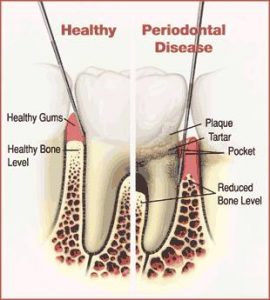Oral Hygiene
We know you've heard it a million times over, from your parents to your childhood dentist..."remember to brush and floss every day!" As simple as that sounds, you would be surprised at the amount of people who do not follow those basic rules, and yet seemed so surprised when we have to deliver the bad news that they need a filling or deep cleaning session.
The truth is, the mouth is the gateway to your body. It has been well documented that dental caries can be linked to heart disease and other illnesses, so it's necessary to visit your dentist regularly and maintain good oral hygiene practices.
So what is good oral hygiene?
Good oral hygiene results in a mouth that looks healthy and smells healthy. Basically:
- Your teeth are clean and free of debris
- Gums are pink and do not hurt of bleed when flossing or brushing
- Bad breath is not a constant problem
If your gums do hurt or bleed while brushing or flossing, or you are experiencing persistent bad breath, see us immediately. AS minor as it may sound, these symptoms may be an indicate a problem that needs to be addressed quickly before it develops further.
How do you practice good oral hygiene?
Maintaining your oral hygiene is one of the most important things you can do for your teeth and gums. Healthy teeth not only make you look and feel good, but they make it possible for you to eat and speak properly. Good hygiene is important for your overall well-being.
What is a good daily preventive care routine?
- Brush thoroughly twice a day, and floss before bedtime.
- Try an electric toothbrush - we recommend the Sonicare from Philips.
- Eat a balanced diet and limit sugary snacks between meals.
- Use ADA approved dental products, ie. toothpaste, mouthwash.
- Ask your dentist if fluoride treatments are right for you.
I'm scheduled to see my Dental Hygienist, can you tell me what their job role is?
The Dental Hygienist is an important part of the dental team, and can help diagnose problem areas early in the process.
Dental Hygienists:
- Remove soft and hard deposits from teeth
- Educate patients on practicing good oral hygiene and preventative care techniques
- Administer initial examination of teeth and gums and record, if any, the presence of disease or abnormalities
During my examination, I hear my dentist or hygienist calling out various numbers, what does this mean? What is "Gingival and Periodontal Pockets"?
More often than not, periodontal examination includes measuring the gingival and periodontal pockets to determine the condition of your gums. In our office, every hygiene appointment includes monitoring these pockets. As your hygienist calls out the numbers, "3,2,...3,2,5...4,2,5...", you might sit and imagine what your hygienist is seeing inside your mouth. The numbers being called out represent the gingival and periodontal "pockets" also known as "sulcular depth" around each tooth. In other words, how deep the unattached tissue is around every single tooth. Each tooth has 6 different sites (or 6 different numbers). The normail depth is three millimeters or less.
Studies and research have shown that sulcular depths of three millimeters or less are either readily self-cleansible or able to be easily cleansed by an individual with the bristles of a properly used toothbrush. When a number is more than 3 mm., even regular toothbrushing will be unable to properly cleanse the depths of the pockets (aka "sulcus"), allowing food debris and microbes to accumulate and pose a danger to the structures, such as PDL fibers, attaching the gingiva to the tooth.
If not treated properly and on time, microbes in the pockets, together with the enzymes they produce, will be able to penetrate and ultimately destroy the delicate soft tissue and periodontal attachment fibers, leading to an even further deepening of the sulcus and eventually destroying the bone which holds the teeth together.
Not to worry though, this can easily be treated, and with proper education and good oral hygiene techniques, prevented in the future.
One of the great things that Dr. Ostad and crew did was help my mom when she needed emergency dentistry care. We had a tough time because she didn’t have […] - Arlene P., Poway
